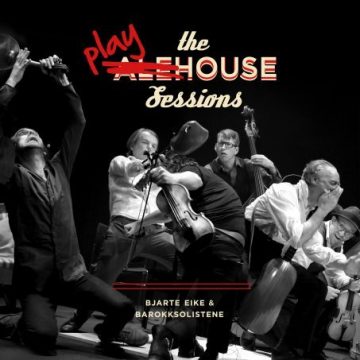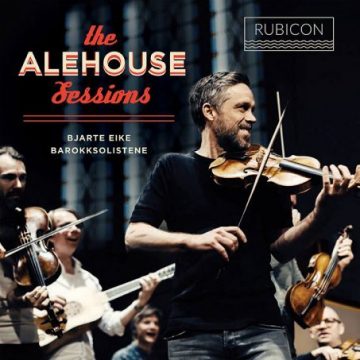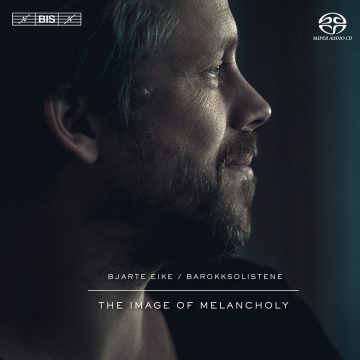Founded and led by Norwegian violinist Bjarte Eike, Barokksolistene is recognised as one of the world’s most dynamic and exciting early music groups, fusing virtuoso musicianship with flawless ensemble playing. Constantly striving to reach out to new audiences, their passion to engage with folk and experimental music, improvisation, visual arts, dance and story-telling has led them to create unique concert experiences which play to sold-out audiences worldwide.
Nowhere is this more evident than in their signature project “The Alehouse Sessions”, an ever-changing look into the music of the English 17th century tavern, and described by The Strad as “innately theatrical, genre bending and suffused with great musicianship”. An album was released on Rubicon Classics and immediately made the UK top 10 classical charts. Since then Barokksolistene has toured Alehouse throughout Europe and the US and it continues to return season-after-season, each time with new ideas. A favourite at the major European festivals, The Alehouse Sessions has found itself a home in spaces as diverse as barns and rock clubs, candlelit theatres and major concerts halls including Elbphilharmonie Hamburg and Usher Hall Edinburgh, excelling in all cases by the immediacy of the music and the connection between performers and audience. Their newest album “The Playhouse Sessions” was also released by Rubicon Classics and has been enthusiastically received with critics praising the exhilarating and stylish performances.
On stage their collaborations have found them working with artists as diverse as choreographer Liam Scarlett on his ballet Vespertine and Norwegian jazz musician Jon Balke, whose Siwan project explores the links between North African Arabic, Andalusian and baroque music and has resulted in three acclaimed albums on ECM.
They have also appeared series of major opera productions, including a staged Messiah with Netia Jones at the Bergen International Festival and Handel’s Alcina for Den Norke Opera Oslo. Taking their approach to integration further, they have worked as both musicians and actors in productions of Purcell’s Dido and Aeneas at Den Ny Opera Esbjerg and Shakespeare’s A Midsummer Night’s Dream at Haugesund Teater.
This biography is for information only and should not be reproduced.
The Playhouse Sessions
This wonderful album takes us back to a time before that stiff, formal artefact we call “classical music” had come into being, when composers rubbed shoulders with actors and folk singers in disreputable playhouses and taverns, and a folk song could migrate from the street to the theatre and even a nobleman’s grand house [....] What Eike understands is that to bring this distant world to life for contemporary audiences, it’s not enough to recreate it literally. You have to mobilise people’s imaginations and feelings, which the group does with great flair and sensitivity. A wonderful example is Purcell’s song “Oft she Visits This Lone Mountain” from his opera The Fairy Queen, which assembles itself from scraps of sound on guitar, harpsichord and bass, before Berit Norbakken’s beautifully soft rendition of the song itself. It exemplifies the way this group catches the magic and mystery of the music, as well as its bawdy humour and rumbustious energy.
Ivan Hewett, The Daily Telegraph *****
Rip-roaring music making effortlessly melds ancient and modern [...] At the core of the album's appeal is not only the shrewdly researched repertoire and uninhibited fantasy of the arrangements but some hand-in-glove ensemble playing conditioned by a thorough grasp of English Baroque aesthetic and gesture. The suave arches of Bjarte Eike's violin on an Adagio from Purcell's Come ye sons of art would grace any recording of the anthem proper.
Peter Quantrill, The Strad
Bjarte Eike and his Barokksolistene approach this music and its cultural context with open hearts and minds. [...] there's no effortful or pointed rewriting, just a gentle blurring or genre and boundaries (plus some seriously stylish playing and singing from all concerned). [...] It's hard to put your finger on the ensembles distinctive appeal but it seems to be a sort of strange reverse alchemy. These are expert musicians who take off their professional hats and muck in as needed, playing multiple instruments and all singing both as chorus and soloists, creating a performance that may not be authentic in a strict historical sense feels absolutely authentic to the spirit of the period and of players - as then, and as now.
Alexandra Coghlan, Gramophone (Editor's Choice)
[This record] makes a good shot at pinning down the essence of a live experience. The Playhouse Sessions, on Rubicon, again sees the violinist Bjarte Eike and his Barokksolistene ensemble recreating the anarchic atmosphere of after-hours musical sessions in Restoration pub backrooms. This time the mix of exhilarating folk music and stylishly appropriated Purcell is loosely themed around A Midsummer Night’s Dream. The team has expanded to include two women, one of whom, Berit Norbakken, sings an understated version of Music for a While with bassist Johannes Lundberg that wouldn’t be out of place in a jazz club.
Erica Jeal, The Guardian
Emulating the creativity unleashed in the Restoration playhouses, this loosely Midsummer Night's Dream - themed programme ricochets from Purcell to folk music, from vocals to instrumentals, in intoxicating style.
BBC Music Magazine ****
while nothing can quite match being in the room, the Playhouse Sessions in recorded form still offers more musical revelation and sheer fun than anything else I have heard recently. [...] The sheer difficulty in pinning down what The Playhouse Sessions is, is one of its delights, and it successfully remakes the magic of the Alehouse Sessions in a way that is both more of the same, and something wonderfully different.
Bernard Hughes, The Arts Desk
A bit of Purcell, folk shanties and ballads by an ensemble that builds on baroque, jazz and folk styles. This is Barokksolistene led by violinist Bjarte Eike who play and improvise without inhibition. You'll find a delightful collection of music and lyrics that will effortlessly take you back three centuries to Henry Purcell's favourite pub.
NPO Radio 4, Netherlands ("Recording of the Week")
The Alehouse Sessions
(...) carefree casualness that can only come from discipline and skill (…) They can U-turn from wild cavorting to a whispered melodic strain with mesmerising mutability. (...)
Judging the pacing and passions of the sets perfectly, he (Bjarte Eike) let the musical temperature rise and fall with hypnotic fluency, playing by turns with vigorous intensity and slender delicacy. His alchemical musical sparks drew everyone in Middle Temple Hall into the musical experience.
Claire Seymour, Opera Today
The authenticity being aimed for is less that of performance style – though the calibre of playing is unimpeachable – and more that of experience...As Barokksolistene's slogan reminds us, "It's just old pop music". Performers like this are unlocking the joy in this music, and that might be the most valuable authenticity of all.
Erica Jeal, The Guardian
From punchy, percussion-rich Purcell and terpsichorean tid-bits from Playford's English Dancing Master, to lusty anonymous a cappella drinking songs and atmospheric ballads, The Alehouse Sessions is a riotous recreation of Cromwellian pub entertainment
Will Yeoman, Limelight
Innately theatrical, genre bending and suffused with great musicianship and string playing, this is a substantial and fine piece of work
Tim Woodall, The Strad
The group's tagline is "It's just old pop music." But their music is much more than that. It invigorates not only the hearing, but also the vision, inspiring a different perspective towards music among audience members. Their uniquely contemporary performance style injects new life into their baroque music and truly exemplifies the beauty of combining the new and the old
Linh Nguyen, The Daily Princetonian
Barokksolistene have been working on this project for almost 10 years, and the performances had a wonderful sense of being thoroughly lived in. The variety of tone and texture was astonishing, ranging from very naughty folk-songs...to delicate dance tunes with a modal tang, from as far afield as Shetland and Norway. The whole joyous evening was a liberation, carrying us back to a time when the terms "classical" and "folk" hadn't yet been invented, and music was simply music
Ivan Hewett, The Telegraph
overflowing musical energy and joy
Alexandra Goghlan, The Arts Desk
Purcell's Playground
I was also moved almost to tears by the group's account of the C-minor Fantasia no 7 where each passing discord was unbearably heartfelt in a way I have never experienced before
D James Ross, Early Music Review
The Image of Melancholy
These varied items are brought together in convincingly sequenced group in which the spirit of improvisation runs high (but not wild) and the differing styles meet on friendly terms, even while each track retains its own integrity and character. The string-playing throughout has the affecting physicality of folk, whether tugging at your emotions in a lament or stirring your (melancholy) feet with bite and swing in a galliard.
Lindsay Kemp, Gramophone
Siwan
Every instrument is equally as impressive. From the beautiful way the strings of Barokksolistene add texture and depth to each song to how Norbakken and Zamini's percussion provide both a backbone and a solid foundation for Balke's keyboards and Turkan's kemence, all the players work together to create a sound that is both captivating and sublime.
Richard Marcus, Qantara
These photos are available to be downloaded.
Right click on a desired image and select the "Save Link As" option.
The Alehouse Sessions
It’s 1642 and Oliver Cromwell has shut down the theatres. Where to go for music, dancing and storytelling? The tavern! Let Barokksolistene take you back to 17th century London in an award-winning show that smashes the traditional concert model to create an evening that is “innately theatrical, genre bending and suffused with great musicianship” (The Strad). Played entirely from memory, the concert mixes Purcell and Playford with shanties and folk songs and has been seen by sold-out audiences throughout Europe and the US.
The Playhouse Sessions
Bjarte Eike and the Alehouse Boys take you by the hand to lead you from the bar of the Alehouse to the backroom where a makeshift theatre is set. After 18 long years Cromwell is gone and the theatrical ban has been lifted. A new flowering of theatre music takes place, where masques and dumbshows rub alongside Shakespeare and Commedia dell’arte in beautiful union. Inspired by historical events, but with recent restrictions and shutdowns firmly in memory, we invite the audience to a real 17th century show – probably with a glass in hand still. Following the same ethos created for The Alehouse Sessions, this new set continues the story and can be performed in tandem with The Alehouse Sessions, with an accompanying album released by Rubicon in 2022.
The Alehouse Sessions - All Aboard!
Let the Alehouse Boys take you on a journey across the oceans! Devised following experiences of playing on tall ships, this version of the Alehouse will lead the audience through a decidedly nautical evening of music heard on the high seas, during storms and in foreign ports. Taking the joy of the original Alehouse this gives a new twist with hornpipes, drinking songs and laments.
The Nordic Sessions
A uniquely Nordic take on the Alehouse Session format, this programme celebrates Scandinavian repertoire of the 17th and 18th centuries and was premiered in Germany in 2021. To give a flavour of this beautiful music, the group has recorded Swedish composer Carl Michael Bellman’s melancholic, gloomy and mysterious “Märk hur vår skugga” ("See how our Shadow”) and added resonant new lyrics in a recently released music video.
The Image of Melancholy
Conceived as a personal reflection on melancholy, this beautiful programme takes us into the sound world of Dowland and Holborne, Biber and Buxtehude as well as drawing from traditional Norwegian melodies and songs. As with all Barokksolistene programmes an element of theatricality prevails, including through the use of subtle pools of lights, and is best performed in the round to draw the audience into the music and performers.



